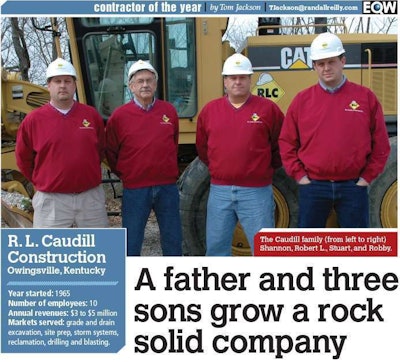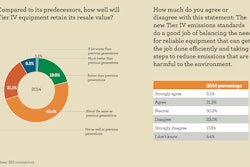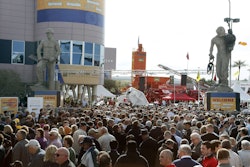
“He will work you to death,” says Charles Carlton, Pike County Fiscal Court.
In Kentucky, however, that isn’t really a complaint. It’s a compliment. “They are all very hard working people. They work until there is no more daylight; worked a lot of days when the weather was tough and other contractors weren’t working,” says Carlton.
It’s understandable, then, he says, that, “Other contractors think they are tough to compete with.”
“Even yesterday it was rainy and 38 degrees, and he’s out there on his dozer,” says David Sorrell, with the Abandoned Mine Lands division of the Commonwealth of Kentucky, about the elder Caudill. “None of his people were out there, but he was out there.”
The patriarch Robert got his first taste of the business running a dozer for one of his brothers. “He fell in love with it,” says son Stuart. “He was good at it and branched off on his own. He’s still active on the jobs, every day. You can’t get him off a dozer or excavator.”
His sons learned his work ethic, how to run the machines and how to manage a job alongside his father. The company grew over the years, doing mostly custom work for farmers and forest service roads. “We slowly grew to a handful of equipment,” Stuart says. “We were doing most of the work as subcontractors, though and I wanted to get us to the point where we could bid jobs on our own.”
To that end Stuart went to Eastern Kentucky University and got a degree in construction management with a business minor. “You can learn more in a week in the field than you can in four years of college,” Stuart says, “but it’s a good foundation. You learn how to run an organization, manage people and schedule jobs,” he says. An in-depth course in surveying was also a big benefit.
That set the stage for incorporation in 1997 and gave them a plan for growth. The father gave sons Stuart and Shannon responsibility for the day-to-day operations of the company, but still works with them every day.
Shannon and Stuart have very different responsibilities. “I handle most of the administrative stuff, bidding, bonding, insurance, financial decisions, as well as engineering out in the field,” Stuart says. “Shannon’s duties are more out in the field, overseeing the jobs and running the drilling and blasting division. All major decisions in the company are made between the two of us.”
The youngest son, Robby, was only 13 when Stuart and Shannon took over but now works for the company full time. Robby works primarily as an equipment operator and can run every machine the company has. He’s also the lead driller for the blasting crews and performs equipment maintenance in the shop during the slow winter months.
Drilling and blasting
With a better understanding of the business end, Stuart set a path for slow and steady growth. “We did smaller jobs at first, to prove we were capable.” The biggest initial hurdle he says was raising capital and getting bonding.
One change that helped the company to grow was to take on drilling and blasting. The hard rock soils of eastern Kentucky don’t yield easily to an excavator bucket and in many of their jobs, the company had to farm out drilling and blasting to a subcontractor.
“Its a tough line of work, especially insurance wise,” Stuart says, “but Shannon got licensed and in 2001 we started doing it ourselves.” Initially the company did drilling and blasting just on their own jobs, but they soon found other contractors in need of their services.
“In the last 10 years we’ve had a blasting crew working year round and a total of three drills,” Stuart says. “Not many people are doing this type of work in this area so it’s been a good market for us. It’s one of the major things that’s helped keep us going through these hard economic times.”
Managing the recession
Like just about every contractor, R.L. Caudill has found the recession tough sledding.
“When the economy went south, a lot of highway contractors started looking for smaller work and started competing with us,” Stuart says. That put lots of pressure on prices and bids. “We didn’t have to lay off any employees, he says, “but as we lost some, we didn’t replace them,” he says.
Having the company on a firm financial foundation before the recession hit helped considerably, and Stuart was even able to turn some negatives into advantages. “What we’ve tried to do is take advantage of it,” he says. “For years we ran the company out of mom and dad’s basement,” he says. “But during the recession we were able to buy the building we’re in now at a foreclosure. We also bought a lot of used equipment at what we thought was a very good price, from contractors who were downsizing or going out of business. But we had to walk a fine line. We didn’t want to overextend ourselves.”
The recession also encouraged Stuart to work the books a little harder and make the jobs they did get more profitable. “We started looking at smaller work and work we wouldn’t have looked at in the past,” he says.
Now that the recession is over, Stuart doesn’t think the volume will get back to where it was at the peak, “We’re on the climb out,” he says, “but it’s still slow.” “We are constantly trying to find ways to reduce costs in order to offset reduced revenues.” The company is also looking at doing more highway work than in the past to open up more opportunities.
They’re also able to add people again. “We look for versatility, people who can do a lot of different things. “The more equipment they can run the better. CDL, that’s a bonus. “We also look for people who will jump down in a ditch and use a shovel.”
Equipment and technology
In just the last year, R.L. Caudill Construction has ramped up its equipment and technology acquisitions to meet future demands. “We’ve added a new Cat D6K2 with Trimble GPS grade control,” says Stuart. “We’ve also added grade control to our Cat 12H grader and added an additional base station. That brings the number of GPS enabled machines the company has to three, and the company uses a GPS rover to check layouts.
The company’s philosophy about equipment is basically to buy and hold and repair as needed until the cost of repairs becomes greater than the benefit of the machine, Stuart says. “We do not turn over inventory regularly.”
Loyal customers
The knowledge, work ethic and business smarts the Caudill family bring to their customers jobs is well appreciated. As is their ability to iron out problems
“First off, he has patience,” says Carlton. “We had a situation where we had to shift a site, and had to ask for a number of extensions because of issues with the Federal Highway Administration and Kentucky DOT. They held their peace while that had to be done. They did a credible job in the development of the site and worked with us during unforeseen circumstances. They have an excellent reputation with us.”
Advice for contractors
When it comes to succeeding in the earthmoving business Stuart has three tips for aspiring construction contractors. First: be willing to work hard, don’t cut corners, and take pride in your work. “Going the extra mile may not always show up on the balance sheet, but it will in your reputation and that is what will make you sustainable in this business,” he says.
Second: be versatile. “The more versatility you have in the services you provide, the more likely you’ll be able to last through the hard times,” Stuart says.
Third: hire good people. “You are only as good as the people you have working for you,” Stuart says. “We have been fortunate to have good, loyal employees and wouldn’t be where we are today without them.










